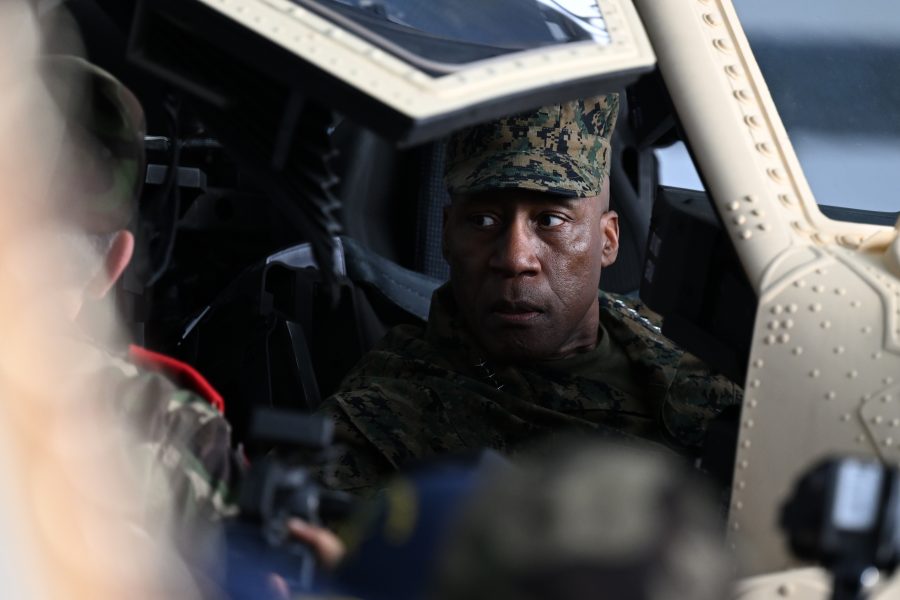U.S. Africa Command has ratcheted up airstrikes in Somalia as it looks to pressure militants there, the head of the command told reporters May 30.
Gen. Michael E. Langley said the U.S. has already carried out more than 25 airstrikes in Somalia this year, “double the number of strikes that we did last year.” The operations have involved American drones and Navy aircraft, U.S. officials have said.
“The U.S. is actively pursuing and eliminating jihadists,” Langley said.
The expanding air campaign comes as the Trump administration has given commanders more leeway to conduct attacks without first securing White House approval and reflects the persistent efforts of Islamic State and al-Shabab militants to entrench themselves in the East African country.
“ISIS-Somalia has proved both its will and capability to attack U.S. and partner forces,” the command said in a release in April. This group’s malicious efforts threaten U.S. national security interests.”
“AFRICOM, alongside the Federal Government of Somalia and Somali Armed Forces, continues to take action to degrade al-Shabab’s ability to plan and conduct attacks that threaten the U.S. homeland, our forces, and our citizens abroad,” the command added May 27.
While the command’s work has been overshadowed in recent months by U.S. military operations against the Houthis in Yemen, the terrorist threat on the African continent has become a nagging concern for the Pentagon. The withdrawal of U.S. forces from Niger last September, carried out at the insistence of the government there, has also made it more difficult for the U.S. to use drones to monitor militant activity in the area.
“Unfortunately, with our withdrawal from the region, we have lost the ability to monitor these terrorist groups closely,” Langley said in response to a question from Air & Space Forces Magazine. He noted extremist violence is also a growing worry in Niger, Nigeria, Burkina Faso and Mali.
The stepped-up violence, he said, “is measurable by both frequency and complexity of these attacks.” One objective of terror groups, he said, was to gain access to the coast in West Africa to facilitate weapons trafficking and other smuggling.
But Somalia remains a major focus on the continent. Langley said the U.S. airstrikes have supported ground operations by Somali government forces against the Islamic State and al-Shabaab, which he described as an entrenched, wealthy, and al-Qaeda-linked group.
“We know that these groups have been adapting and increasing their reliance on ambushes and [improvised explosive devices],” he added. “These increased strikes have achieved tactical gains against both groups. The lasting success will require a comprehensive strategy and addressing the root causes of instability.”
American aircraft also struck boats carrying “advanced conventional weapons” in Somalian waters on April 16, the command said in a release. “The weapons were enroute to al Shabaab terrorists inside Somalia and posed an imminent threat to partner and U.S. forces in Somalia.”
Africa Command’s public statements often note that multiple militants have died in airstrikes the organization frequently labels as “collective self-defense.” The command has issued 27 press releases announcing airstrikes in Somalia so far in 2025, 10 of which indicate multiple strikes on a given day.
The U.S. confirmed it had killed senior al-Shabab leader Mohamed Mire and another militant in a Dec. 24 airstrike.
“Mire, also known as Abu Abdirahman, was responsible for al-Shabab’s regional governance in Somalia for the last 15 years,” Africa Command said in a release. “In addition to being one of al-Shabaab’s longest serving members, Mire served as the interior minister and played a key role in the group’s strategic decision-making.”
Just over a month later, Ahmed Maeleninine, a “key ISIS recruiter, financier, and external operations leader responsible for the deployment of jihadists into the United States and across Europe,” died Feb. 1 in the first U.S. publicly announced airstrike of the year in Somalia, the command said.
The command often states no civilians were killed in a given strike.
“U.S. Africa Command takes great measures to prevent civilian harm,” the organization said in a Feb. 1 release. “Protecting civilians remains a vital part of the command’s operations to promote a more secure and stable Africa.”
